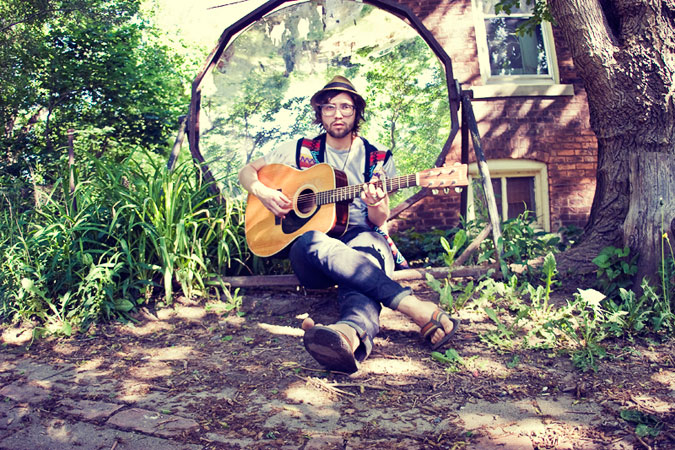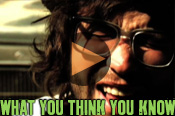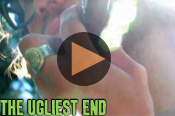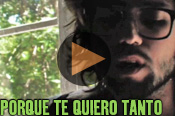the basis and essence of all things in the material world; the smallest material element created from the astral world
"...plants teach us lessons- plants and mushrooms have been on earth longer than humans, they are more evolved than we are- they strip away things in our brains that have been built up by the way we are raised, and can show us the world in a more natural way" Alan Scheurman may as well have been talking about his own neighborhood, 4th street, where we were shooting that day. May 31, 2009, and the end of fourth street is wild with flowers, trees, and grasses- in the mottled light of morning and leaves- a peahen, a rooster, and a chicken intermittently cackle and slide in and out of shadows and the rotten corpses of Motor City might- a series of shell cars looking on a fire-pit whose ashes still smolder from the night before. Plants have indeed stripped away the culture of Detroit on fourth street and left it more natural- only feet away I-94 bazooka fires cars from Detroit to Ann Arbor, Chicago, Wisconsin and beyond- but here the only sounds are the wind giggled leaves, the staccato matins of the fowl, the stripped down jangling thump of Alan Scheurman's guitar, and the gentle hint of his whispered singing voice.
He himself has been stripped down by plants- his apartment with its clean bare white walls adorned only by bunches of dried flowers hanging from the moulding and a rainbow coaxed in the room by crystals hanging too. His music too is noticeably more concentrated and restrained, than the excited polyphony of his previous band RESCUE. His technicolor sweater vest is his own paean to the peacock outside. It is as if he has grown into the neighborhood, and merged his unique voice into biological harmony with the burgeoning wilderness that has become of the block.
My attempts to learn about the communal/artistic origins of the Fourth Street neighborhood were fruitless. As far as I can glean the neighborhood was transformed by the social movements of the 60's and seventies and isolated between the plants and the freeways it managed to escape the social disfigurements of the riots, Reagan and the recessions. In fact, the construction of I-94 provided the opportunity for the area to become culturally autonomous by transforming 4th street from a thoroughfare into an isolated corner with the university as its only frontier. The rest seems to have developed as quietly, persistently, passionately, and organically, as the growth of the plants that have stolen the neighborhood from the consequences of our current urban dilemma.
Mushrooms grow on dead things. As far as scientists can tell they distill the toxins in nature and make room for new growth. Alan is an oracle. The sweet hoarse whisper of the mushroom spirit, the foot tap of the tiny plant pressing against the infinite soil above. In a song he can tell us what Michigan can learn from 4th Street, and what 4th Street learned from silent millennia of pre-human life between the Great Lakes- strip away what humankind has done, allow nature to act freely and you will find humankind in its purest form between the curling flower spaces.
- Phreddy Wischusen
"...plants teach us lessons- plants and mushrooms have been on earth longer than humans, they are more evolved than we are- they strip away things in our brains that have been built up by the way we are raised, and can show us the world in a more natural way" Alan Scheurman may as well have been talking about his own neighborhood, 4th street, where we were shooting that day. May 31, 2009, and the end of fourth street is wild with flowers, trees, and grasses- in the mottled light of morning and leaves- a peahen, a rooster, and a chicken intermittently cackle and slide in and out of shadows and the rotten corpses of Motor City might- a series of shell cars looking on a fire-pit whose ashes still smolder from the night before. Plants have indeed stripped away the culture of Detroit on fourth street and left it more natural- only feet away I-94 bazooka fires cars from Detroit to Ann Arbor, Chicago, Wisconsin and beyond- but here the only sounds are the wind giggled leaves, the staccato matins of the fowl, the stripped down jangling thump of Alan Scheurman's guitar, and the gentle hint of his whispered singing voice.
He himself has been stripped down by plants- his apartment with its clean bare white walls adorned only by bunches of dried flowers hanging from the moulding and a rainbow coaxed in the room by crystals hanging too. His music too is noticeably more concentrated and restrained, than the excited polyphony of his previous band RESCUE. His technicolor sweater vest is his own paean to the peacock outside. It is as if he has grown into the neighborhood, and merged his unique voice into biological harmony with the burgeoning wilderness that has become of the block.
My attempts to learn about the communal/artistic origins of the Fourth Street neighborhood were fruitless. As far as I can glean the neighborhood was transformed by the social movements of the 60's and seventies and isolated between the plants and the freeways it managed to escape the social disfigurements of the riots, Reagan and the recessions. In fact, the construction of I-94 provided the opportunity for the area to become culturally autonomous by transforming 4th street from a thoroughfare into an isolated corner with the university as its only frontier. The rest seems to have developed as quietly, persistently, passionately, and organically, as the growth of the plants that have stolen the neighborhood from the consequences of our current urban dilemma.
Mushrooms grow on dead things. As far as scientists can tell they distill the toxins in nature and make room for new growth. Alan is an oracle. The sweet hoarse whisper of the mushroom spirit, the foot tap of the tiny plant pressing against the infinite soil above. In a song he can tell us what Michigan can learn from 4th Street, and what 4th Street learned from silent millennia of pre-human life between the Great Lakes- strip away what humankind has done, allow nature to act freely and you will find humankind in its purest form between the curling flower spaces.
- Phreddy Wischusen
4th Street is surely an urban oasis in the D, with several community gardens, a volleyball court, chess & dog park, and an authentic sense of community in an otherwise seemingly blighted and lonely area. 4th St. has certainly become quite an example of how decayed urban neighborhoods can utilize empty lots and defy every negative stereotype of rust belt cities such as Detroit. And they always have - since the "love-ins" of the late 1960s. Good thing this block accidentally didn't get bull-dozed when the State leveled Paradise Valley (aka Black Bottom) to put in the freeways...for what we have now is a stellar example of a downtown Detroit neighborhood with homes from the 1920s-1940s.
4th Street has played an integral role in developing, incubating and cultivating some of Detroit's most forward urbanites since the 1960s. Famed musicians, artists and activists such as the notorious John Sinclair, have resided on the legendary semi-isolated 1-block neighborhood since the Civil Rights Movement and the arts uprising of the late 1960s. Over the years, 4th Street has been home to countless Wayne State University and Center for Creative Studies students and faculty, not to mention numerous famous Detroit band members, visual artists, DJs, producers, and independent shop owners - all of whom live, eat, and breathe the downtown city proper - a core part of the heart & soul of the Cass Corridor.
The "Positively 4th Street" Fair has been taking place each July for almost 40 years. There is still debate over which year it actually started (as it was really just a block party that reigned in people from around the neighborhood, and eventually the city). The 4th Street Fair is known as the event where many of Detroit's bands get their first gig as a "festival break." This is definitely a place to discover in Detroit.
Source: 4th Street Block Club
4th Street has played an integral role in developing, incubating and cultivating some of Detroit's most forward urbanites since the 1960s. Famed musicians, artists and activists such as the notorious John Sinclair, have resided on the legendary semi-isolated 1-block neighborhood since the Civil Rights Movement and the arts uprising of the late 1960s. Over the years, 4th Street has been home to countless Wayne State University and Center for Creative Studies students and faculty, not to mention numerous famous Detroit band members, visual artists, DJs, producers, and independent shop owners - all of whom live, eat, and breathe the downtown city proper - a core part of the heart & soul of the Cass Corridor.
The "Positively 4th Street" Fair has been taking place each July for almost 40 years. There is still debate over which year it actually started (as it was really just a block party that reigned in people from around the neighborhood, and eventually the city). The 4th Street Fair is known as the event where many of Detroit's bands get their first gig as a "festival break." This is definitely a place to discover in Detroit.
Source: 4th Street Block Club















What You Think You Know
[Download MP3]
The Ugliest End
[Download MP3]
Porque Te Quiero Tanto
[Download MP3]
The Cosmic Plan
[Download MP3]
Akasha/Starless
[Download MP3]
[Download MP3]
The Ugliest End
[Download MP3]
Porque Te Quiero Tanto
[Download MP3]
The Cosmic Plan
[Download MP3]
Akasha/Starless
[Download MP3]
Director
Katie Barkel
Sound
Edits
Katie Barkel
Stills
Ed Knight



